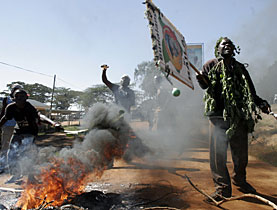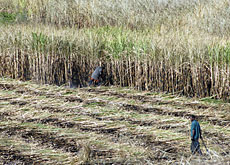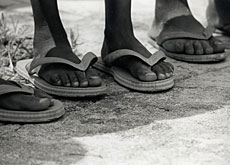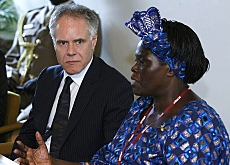Bern issues warning over Kenya situation

The Swiss foreign ministry has warned tourists against all but essential travel to Kenya, where the death toll from tribal violence has passed 300.
It has also expressed its concern at the situation in the African country as diplomatic efforts continue to try to defuse the political crisis.
Bern has urged politicians to “do everything to find a dialogue for Kenya’s political future”.
The violence was sparked by charges President Mwai Kibaki stole his way to re-election on December 30. EU observers said the poll “fell short of international standards”.
Kibaki’s government accused supporters of the opposition leader, Raila Odinga, of organising the violence.
Odinga, meanwhile, accused the government of “genocide” and later said he would go ahead with plans to lead a protest march in the capital on Thursday.
Ghanaian president and African Union chairman John Kufuor has announced a mediation mission to Kenya to help end ethnic killing. This follows calls for restraint and dialogue from the United States and former colonial ruler Britain.
Many Kenyans have been forced to take refuge from armed mobs and looters. The worst affected areas have been Nairobi’s slums and western towns such as Busia, Eldoret and Nakuru, but the eastern coastal resort town of Mombasa has also been hit by spontaneous violence.
Abbas Gullet, the secretary general of the Kenya Red Cross, described the situation as a “national disaster”, adding: “A few hundred thousand will need assistance for some time”.
In a statement, the Swiss foreign ministry declared that it would be examining how to provide humanitarian assistance to those worst affected. It also said that embassy staff would be strengthened from Thursday onwards.
The Swiss colony in Kenya numbers about 900 and the embassy says it has regular contacts with the people on its register. No one has asked for assistance, the statement added.
Travel advice
For many observers the upsurge in violence comes as a surprise. Kenya is generally regarded as one of the most stable democracies on a volatile continent.
It is also a popular tourist destination. Kenya’s tourism industry brings in some $900 million (SFr1 billion) a year and attracts more than one million visitors a year.
On Wednesday the Swiss foreign ministry joined France, Austria, Italy and Belgium in downgrading its travel advice.
“As long as the situation has not been clarified, it is inadvisable to travel to Kenya as a tourist or for non-urgent matters,” it stated on its website.
The ministry also warned nationals not to visit slum areas in Mombasa or Nairobi, or the towns of Eldoret, Kisuma or Kericho in western Kenya.
Around 1,000 Swiss tourists are thought to be currently holidaying in the country, mostly in the eastern coastal region.
Travel agent Hotelplan said all its clients have not had any problems, although planned safaris and excursions have been cancelled as a safety measure.
“The tourists are very calm; they don’t have a great deal of news about the events,” the head of Hotelplan in Mombasa, Fabrizio Barile, told Swiss radio on Wednesday.
Kuoni, Switzerland’s biggest travel specialist, said on Tuesday that none of its customers have had to forego safaris.
Kunoi spokesman Peter Brun announced that any Swiss reservations made for Kenya could be cancelled or changed without charge.
Brun also declared that the next two or three days would be “decisive”.
swissinfo with agencies
During the election campaign, Kibaki lagged well behind Odinga in all opinion polls but closed the gap to a few percentage points in the last two weeks.
Kenya’s Electoral Commission declared President Mwai Kibaki the winner on December 30, but supporters of his main challenger, Raila Odinga, believe he was cheated of victory.
EU observers said the poll “fell short of international standards” and in a joint statement Britain and the United States noted “independent reports of serious irregularities” but said their immediate focus would be working on a political compromise and ending the bloodshed.
Violence erupted after Kibaki declared himself victorious and was sworn back into office almost immediately. The political rift quickly took on a tribal element, with members of Kibaki’s Kikuyu tribe, long dominant in politics and business, under attack.
While some fear Kenya is facing its worst crisis since independence in 1963, inter-ethnic clashes are common in Kenya, especially at election time. In 1992 some 1,500 people died in fighting in the Rift Valley region. Five years later, another 200 were killed, mainly in fighting in the country’s second city, Mombasa.

In compliance with the JTI standards
More: SWI swissinfo.ch certified by the Journalism Trust Initiative



You can find an overview of ongoing debates with our journalists here . Please join us!
If you want to start a conversation about a topic raised in this article or want to report factual errors, email us at english@swissinfo.ch.